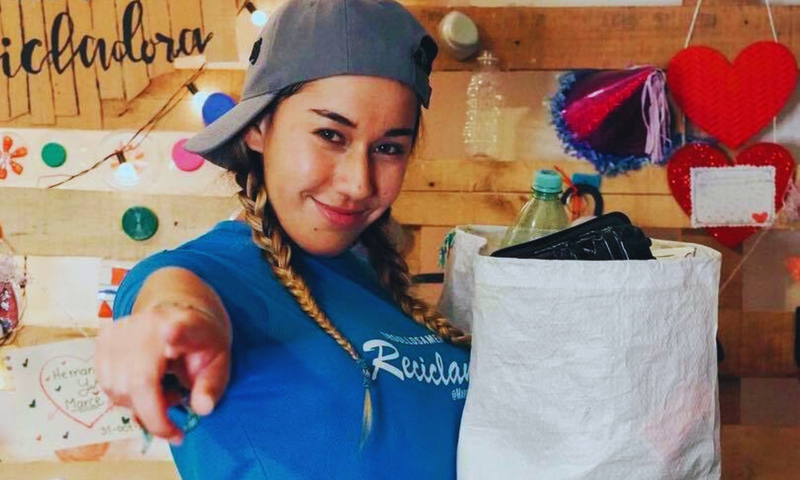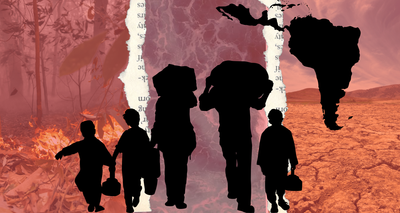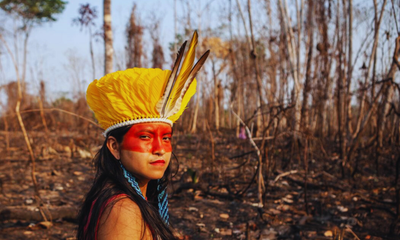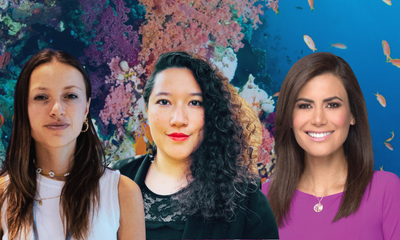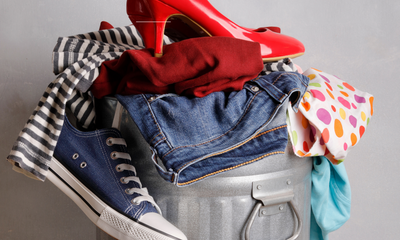With giant bags filled with paper, cardboard, and plastic as her backdrop, a young woman in a blue jumpsuit with two pigtails and a baseball cap waves at the camera. She calls her fans Reciclamores (“recyclovers”)—a group of followers that has reached a whopping 572K on Instagram and 405.4K on TikTok. Latinos and/or Latin Americans have long embraced sustainability, often without labeling it as such. From reusing and recycling jars and repurposing clothing to traditional farming methods that respect the land, environmentalism is embedded in everyday life. Building on this cultural legacy, modern activists are stepping up to redefine sustainability for a new era.
Who Is Marce la Recicladora?
Marce la Recicladora (Marce, the Recycler) is a fictional character brought to life in 2019 by Sara Samaniego, an environmental activist who used her Social Communication degree and her online presence as a platform to humanize and dignify a stigmatized labor force.
“In Bogota, there are 24,000 recyclers, it is an undervalued trade and they are frowned upon,” she said in an interview with Deutsche Welle.
Despite the prejudice towards recyclers, it is thanks to their daily work that Bogota’s waste processing system does not collapse. For example, according to information from the National Department of Statistics (DANE), the recycling and new utilization rate was 11.82 % for 2018 and the goal for 2030 is to reach a rate of 17.9 %.
Living hand to mouth, whole families roam the streets rummaging through the trash that others leave outside their homes and businesses, looking for recyclables to sell. Sadly, this back-breaking work makes them earn between $4.5 and $5.5 daily, according to an interview in LOS40.
The Origins of Marce la Recicladora
During her childhood, Sara and her three sisters spent much of their time in the countryside, where her mother was from. Because there was no garbage collection, families had to burn the trash, something that Sara found shocking even then. Years later, as a student at Javeriana University, she made a documentary on garbage for one of her classes and got to know many informal recyclers.
“That perspective changed me and showed me a reality that I was unaware of. I wanted to show that reality to the world,” Samaniego said in an interview with The New York Times en Español.
Initially, the idea was to find a real recycler to be the face of the YouTube channel, but when she tried to approach potential subjects, many were wary, didn’t like cameras, or couldn’t find the time to commit to the project. She did a casting call for actors who could play the part and that didn’t work either, so she eventually decided to become Marce. She accompanied waste pickers on their routes for three months to get to know them and ask them more about their lives.
When she first started doing videos, she tried to make herself look more run-down, but soon she realized she was perpetuating ugly stereotypes and stopped. The story she created was so convincing that many followers thought Samaniego was a real recycler and lashed out at her for having deceived them.
“It was so real that many people believed Marce existed,” Sara said in an interview with Deutsche Welle.
Recycling Beyond the Camera
Thanks to how fast Samaniego’s videos spread, she has taught the general public how to recycle properly, saving informal recyclers the time-consuming step of cleaning the items well before processing them. “You can be an influencer and act to make an impact,” she said in an interview with Deutsche Welle.
Apart from her social media campaigns, Samaniego raised funds during the COVID-19 crisis to donate food to informal recyclers. After this, the next step was to create Reciclando Amor, a nonprofit organization that carries out different cleaning actions in different parts of the country like beaches and rivers. One of the programs she has launched to help the recycling community is Adopta a un Reciclador (“Adopt a recycler,”) where she establishes a link between a person and an informal worker.
Her activism has led her to win the National Youth Talent Award, a recognition that allowed her to travel to Munich, Germany, to represent Colombia at an international event with other young activists.
The Broader Impact of Recycling Activism
Apart from Sara Samaniego’s commendable work, there are a few more recicladoras who have overcome terrible adversities and reached places of visibility and power. Such is the case of Natalia Zaracho, who became the first cartonera congresswoman (that’s the name recyclers have in Argentina.)
She was born at Villa Fiorito, the slum where global soccer legend Diego Maradona was born. At the age of 12, during the 2001 crisis that left the country in ruins, both of Natalia’s parents lost their jobs, so she was forced to leave school and go to work picking trash. Her life story is an echo of thousands of men and women who go around the capital collecting cardboard.
“I was robbed of the possibility of thinking, we lived from day to day, that can't happen again with the children of today,” she said in an interview with Infobae.
22 years later, she became a politician who advocates for the poor and against social injustice. She may spend her workdays in the Legislative Palace but still lives in the neighborhood she grew up in and still suffers police brutality from officers who don’t recognize her as a deputy.
“I am a congresswoman, get used to the fact that you are going to see more and more poor people in Congress,” Natalia said in another interview with Infobae.
Zaracho’s political success may be an isolated case, but many recyclers are activists who raise their voices every day to share their struggles and lend a hand to those in need.

